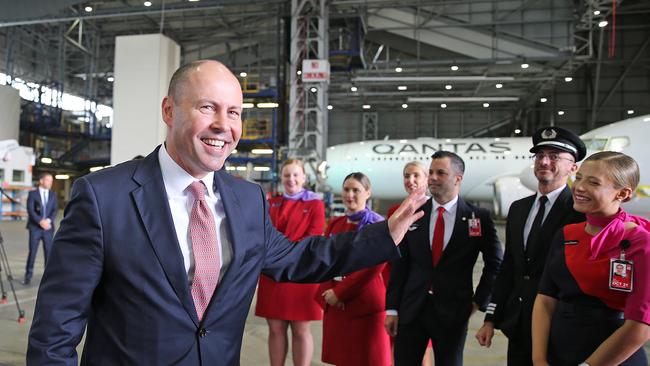JobKeeper worked maybe a little too well
While there was some ‘over-indulging’ by the big end of town, the $90bn or so spent on JobKeeper did the job it was designed to do.

Terry McCrann
Don't miss out on the headlines from Terry McCrann. Followed categories will be added to My News.
The $90bn or so spent on JobKeeper worked. Did it work too well?
Did it feed billions of dollars into big company profits and on to executive salaries and bonuses and indeed dividends for investors?
These questions – and indeed the seeming answers – are sparked by the impressive analysis of the JobKeeper payments to the very ‘big end of town’, the top 300 listed companies, from Dean Paatsch’s Ownership Matters.
They were also ‘answered’ by the February jobs and jobless numbers from the ABS, showing jobs were back to their pre-virus level, although the number of jobless was still much higher.
The first big point is that those 13m jobs included over 1m still being supported by JobKeeper.
Clearly, not all of those jobs or even most of them are going to disappear when JobKeeper (mostly) ends in two weeks – the most optimistic estimates are that only 100,000 will go into unemployment. We, bluntly, will find out.
I suggest the ABS numbers are at the overall level a ringing endorsement of JobKeeper.
It had two purposes.
It was designed first to support the broad economy, as it went over the cliff in the June quarter last year – plunging by a never-before 7 per cent - as a direct consequence of the national mandatory lockdown.
Now, we can argue whether we should ever have had such a lockdown – after the big, and best, decision, to close the international border.

But we did have the lockdown – that’s the sort of decision we elect and pay politicians to make - and JobKeeper was a reasonable and indeed necessary counter.
JobKeeper played a big and perhaps the biggest role in, first moderating the plunge – the UK economy plunged 20 per cent; and then the strong spring back in the September and December quarters after the national and then the one-off Victorian lockdowns ended.
Secondly, it was aimed at keeping specific jobs and skills alive – and indeed their employing businesses – by keeping workers in touch with their job, even if they were sitting at home.
On that front it worked spectacularly. At its peak JobKeeper was supporting 3.6m workers – fully one-in-every-four and closer to one-in-three in the private sector.
It’s now down to 1.1 million and the 2.5m that have left it haven’t gone onto the dole queue but back to real jobs and mostly the ones that they already had.
While showing that there was some ‘over-indulging’ by the big end of town – I would argue the word ‘rort’ is not applicable – the Paatsch OM analysis actually supports this conclusion.
The analysis showed that the top 300 got $2.45bn in JobKeeper payments and almost one-third of the entire amount, $724m, went to one single company, Qantas.
Qantas (and Virgin, which was not listed through 2020) had its entire business mandatorily shut down for three months and more than half shut all year.
It would have had to sack far more workers than the 6000 it did but for JobKeeper, with devastating flow-on into the broader economy. And it most certainly didn’t turn JobKeeper into profits and executive payments.
Take out Qantas and the other 299 top 300 companies got less than $2bn from JobKeeper out of the $90bn.
The valid criticism of JobKeeper was that it was too broad-brush and the initial $1500 one-size (doesn’t) fits-all payment was for six months.
I argued right at the start that Treasury should have just copied the NZ scheme - which it did belatedly but felt obliged to ‘tinker’ with. NZ was for 12 (not our 26) weeks initially and had two-tiers, with a lower payment for part-timers.
But even with all that said, I would still give JobKeeper a broad tick. Also that it, broadly, ends now, with a modified continuation for the airlines.
Originally published as JobKeeper worked maybe a little too well



